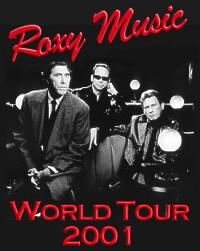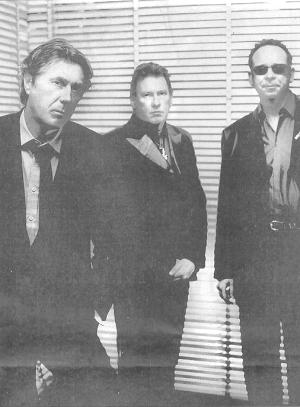
| INTERVIEWS Back to that futuristic sound Roxy Music are reforming to perform their greatest hits. Eternal sentimentalist Bryan Ferry is adamant that it's not an exercise in nostalgia. Neil McCormick reports Daily Telegraph, 7th June 2001 |
![]() T all seems a long time ago now, but, when
Roxy Music first appeared in the early Seventies, they
T all seems a long time ago now, but, when
Roxy Music first appeared in the early Seventies, they  looked
and sounded like the future. Dressed like renegades from a trashy rock-and-roll,
sci-fi comic book, they performed a brash and outrageous brand of art-pop
full of weird electronic noises (courtesy of an immensely complex new-fangled
gadget known as a synthesizer), fronted by a foppish pin-up whose highly
stylised vocal style operated at something of a tangent to the actual
melodies.
looked
and sounded like the future. Dressed like renegades from a trashy rock-and-roll,
sci-fi comic book, they performed a brash and outrageous brand of art-pop
full of weird electronic noises (courtesy of an immensely complex new-fangled
gadget known as a synthesizer), fronted by a foppish pin-up whose highly
stylised vocal style operated at something of a tangent to the actual
melodies.
In 1972 came the debut single, Virginia Plain, the first of an unbroken sequence of hits. Eight distinctive, frequently ground-breaking studio albums (featuring numerous line-up changes and stylistic developments) followed over the next 11 years. Roxy established themselves as one of the most creative and influential groups in popular music.
Tomorrow night, in Dublin, the three longest-serving members of Roxy Music will be reunited on stage for the first time since 1983. They have no new material to promote, nor are there any plans to go into the studio. The one-time futurists have got back together for a lucrative greatest-hits world tour (with dates in the UK between June 11 and 24), becoming the latest of many groups to have reformed in recent years to exploit their musical heritage. Roxy's leader, Bryan Ferry, amiably brushes away the notion that this is nothing more than an exercise in nostalgia.
"In a music world which is only interested in the latest fad, Roxy does seem old," he admits. "But, if you are looking at it in art history terms, 50 years is a period - that's how I see it. So Virginia Plain is still part of the same period as any new work I do. It's my period. It doesn't seem nostalgic to me."
Ferry has long since traded in his leopard-skin jackets for classic sweaters. But, while his image these days may be more Country Life than Street Life, he still cuts a remarkably handsome and debonair figure at 56.
If there is an ageless quality to Ferry, it may be because he was old before his time. For all Roxy's radical musical agenda, their principal songwriter never disguised his sentimental attachment to his musical past. In the Seventies, at the height of Roxy's pop stardom, he took sabbaticals to record unique interpretations of classic songs from the preceding three decades on albums such as These Foolish Things and Another Time, Another Place.
"I used to deliver the Melody Maker when I was 10 or 11," Ferry recalls. "I would walk down the street with a big bag of papers reading about jazz and blues singers, and I became hooked. But they were all old people; music wasn't by teenagers then. I'd listen to Leadbelly on the radio, and go to the City Hall in Newcastle to see people like Ella Fitzgerald and Count Basie.
"Later, with the Beatles and the Stones, there was a fantastic rush of adrenaline. Young people were making music, and that was great, too, but it wasn't in my consciousness that music had to be youthful."
Ferry says that he can identify all those influences in Roxy's earliest recordings. "Even though you don't naturally think of jazz and blues when you think of Roxy Music, there's a very strong connection. I couldn't have written those songs if I hadn't absorbed all that music. We certainly wanted to put a futuristic slant on it. But the first album compresses all these disparate sources into each song. It was as if you had to say as much as you could, in case this was the last record you were ever going to make."
While Ferry may have been the dominant character, Roxy Music was never a solo project. The group went through a succession of bassists and drummers (original drummer Paul Thompson has been recruited for this tour), but the core members - saxophonist Andy Mackay and guitarist Phil Manzanera - had prominent musical personalities. Each went on to enjoy considerable success as composers and producers in their own right.
This strong cast of characters have not always got along with each other. One key member, Brian Eno, will not be joining his former band mates. Clashing with Ferry, Eno departed after the second album, a situation that Ferry admits to regretting. "Ours was a short but intense relationship. We were living the life - it was like music and the band and nothing else. That first period was a powerful time for me, very resonant still. I suppose we were an unusual collection of people."
"Being in a band is not a natural state," adds Manzanera, a remarkably well-adjusted individual, who has become established as a leading producer of world music. "If it's worth anything, it has to have some sort of creative tension, and that means the mechanics of what happens can be fraught with personal differences.
"Essentially, it was Bryan's journey we were going on, in the sense of the lyrics and ideas. But it was our journey musically. We provided the context for Bryan to express what he was about. I think we made a unique sound with very simple ingredients. And, if you were to take any piece out of it, it wouldn't have been as good."
Ferry says: "I'm hoping to make this as pleasurable as I can for everybody, and to make it a celebration of that material."
He rather bashfully admits that his brush with death last year may have played a part in his willingness to revisit his back catalogue. Ferry and his family were on board a British Airways jumbo jet flight to Nairobi in December, when a mentally disturbed passenger forced his way into the cockpit and seized the controls, causing the plane to plunge before the pilot wrestled him to the floor. The next day, a startled Ferry appeared on the front page of many newspapers in a photograph taken during the incident.
"Yes, the shocked face. Doomed! Doomed!" chuckles Ferry. "It's a shame I wasn't advertising a new album! I fly a lot, and every time there's turbulence I think, 'Oh my God, here we go.' So it was a pretty extreme version of that. I don't know what flashed through my silly mind. 'Oh, what a shame there won't be a Roxy reunion!' "
He laughs but looks almost sheepish with embarrassment as he admits: "Obviously, it makes you appreciate every day afterwards much more fully."
Ferry may be unwilling to acknowledge nostalgia, but this most sentimental of singers does not deny the emotions stirred by revisiting his past. "It's very moving for me to sing those songs, because I have my memories of performing them for the first time, and recording them. These go through my head as I stand on stage. Plus you have the shared experience of the audience who have lived with that music for 30 years. It means a lot to them.
"So there's a lot of feeling welling up at you. Sometimes it's a bit overwhelming, especially on the sadder songs. Which is what live music is all about. I suppose we're going to find out if Roxy's music is still alive."